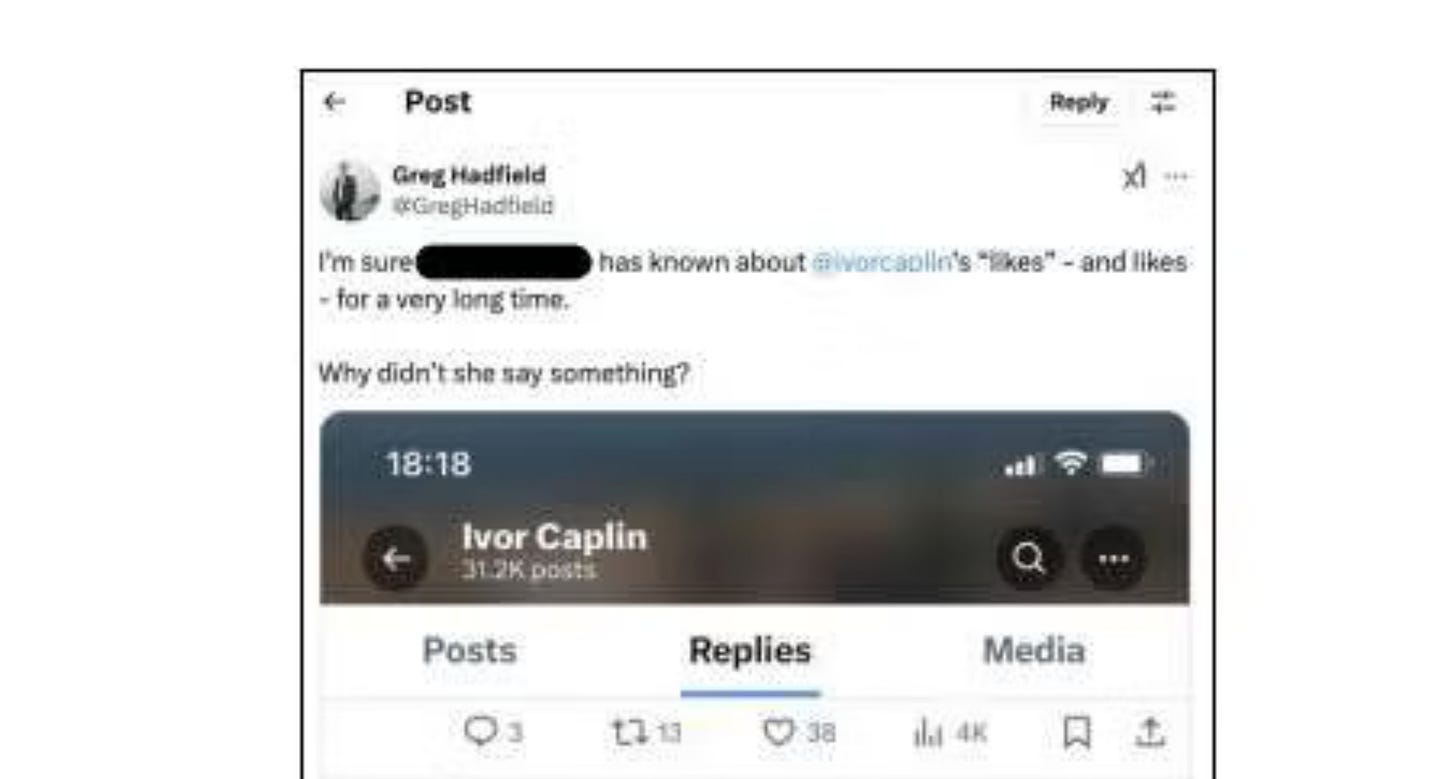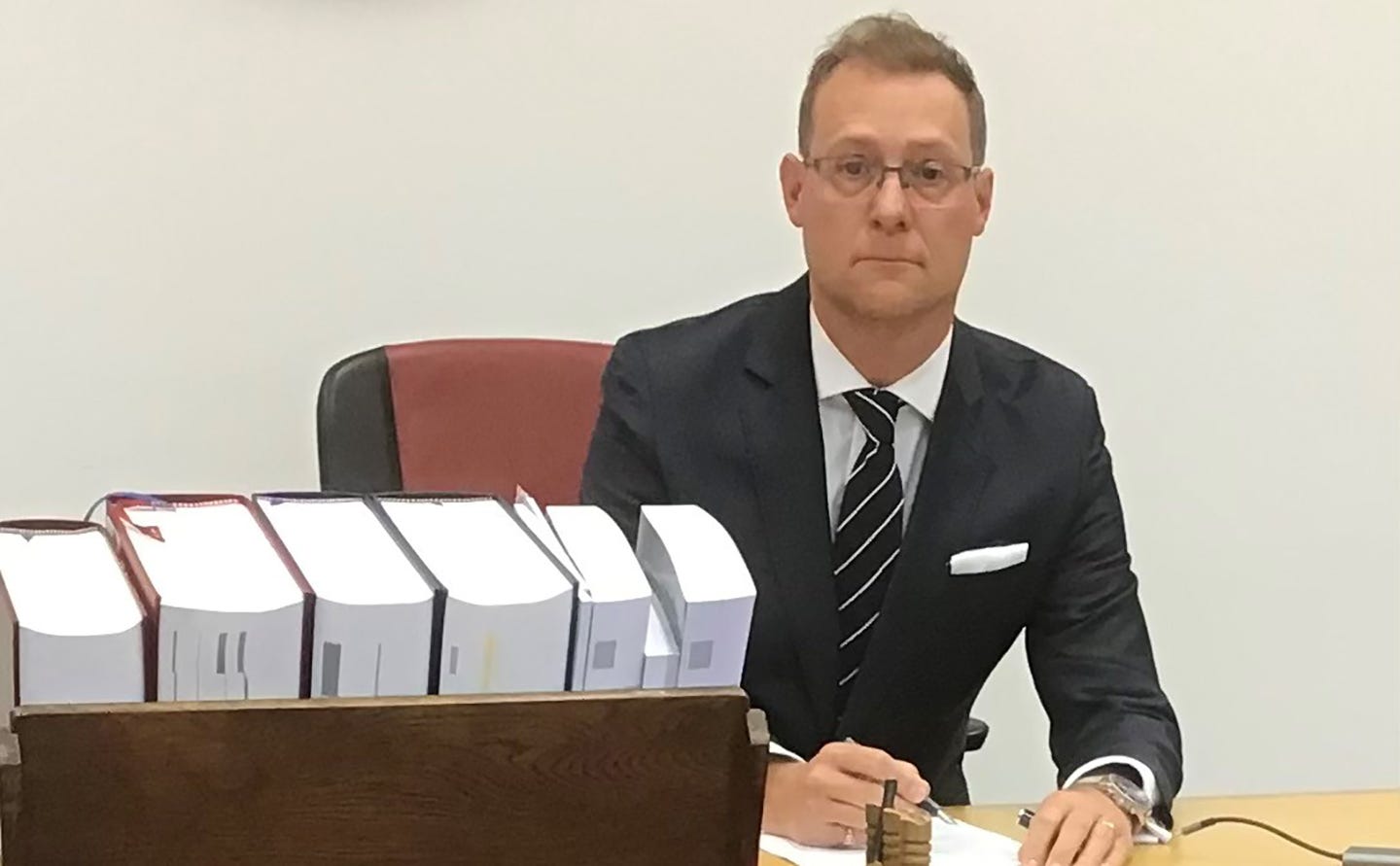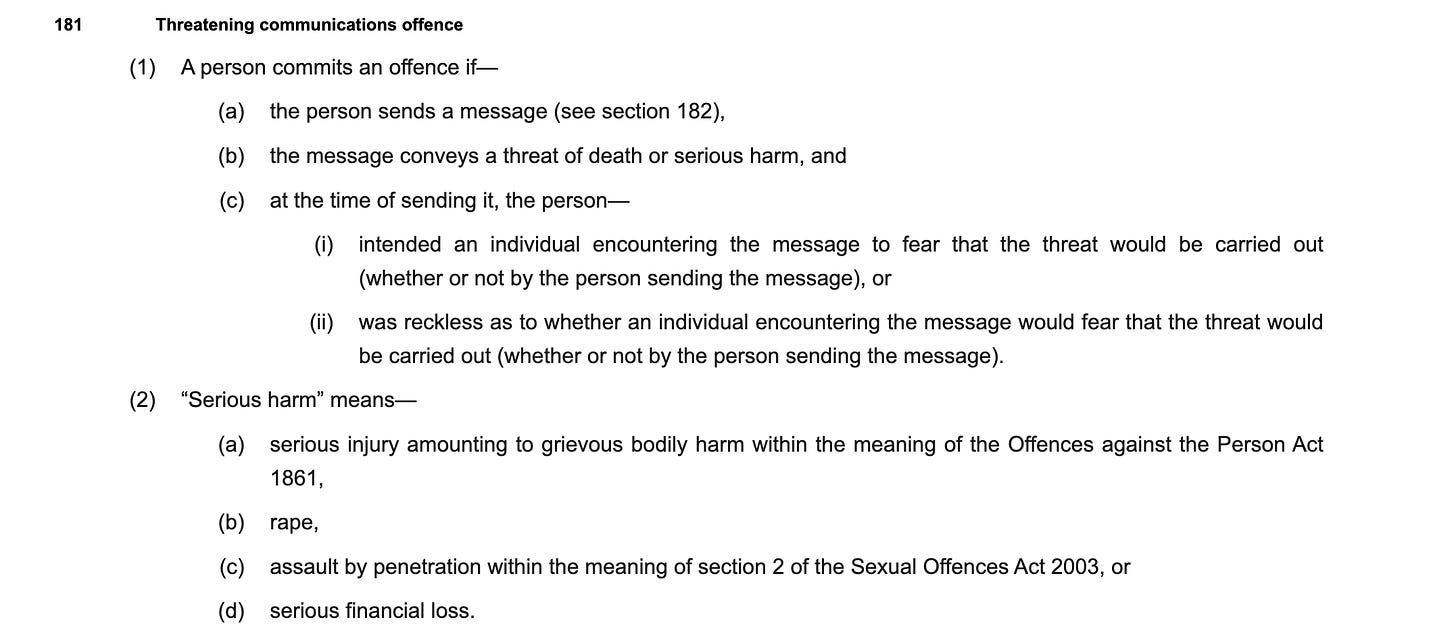
CPS prosecutes ex-Times journalist for… sharing screenshots and asking questions about a particularly “dodgy” former Labour MP.
JJ STARKEY
On our rain-sodden isles, a battle still ensues, where Brits fight back against their authorities that seem set on eroding liberty rather than preserving it.
First, Nathan Poole, a non-violent Southport protestor who chanted “who the f*** is Allah” was sentenced to a whopping 30 months in jail this week. Next, journalist Rebecca Tidy revealed how police quizzed her about an online post over a former police sergeant. Then, Thames Valley Police confronted American mother, cancer patient, and Trump supporter, Deborah Anderson, at her home and told her to apologise over more online posts.
But there remains another frightful case that has thus far evaded mainstream notice—the case of former Times journalist Greg Hadfield. One that puts our speech rights under direct judicial scrutiny.
You see, last year, Greg, like others, noticed something strange. An account belonging to a former Labour MP for Hove, Ivor Caplin, was purveying in disturbing explicit sexual content online.
Caplin, 66, had been commenting on numerous posts by young gay men, often encouraging them to share more of the same and, in some cases, appearing to flirt with the idea of engaging in it himself.

These are confirmed posts made from Caplin’s account. The suspicion is he posted them assuming they were private messages, not public comments.
In June 2024, Hadfield posted screenshot of Caplin’s online activity, further questioning whether a Labour Party colleague had known about it for “a very long time” and asked, “Why didn’t she say something?”
He also redacted the explicit words and images so other users wouldn’t see it.


In January 2025, Sussex Police ended up arresting Caplin—the former Parliamentary Under-Secretary of State for Defence—on suspicion of engaging in online sexual communication with a child.
The arrest occurred after a paedophile sting in which hunters allege they caught him attempting to meet a child.
Responding to an allegation that he knew the “child” he was speaking to online was still in school, Caplin replied: “That’s not the same as knowing their age.”
It was a telling, implicit admission that he knew the person he was speaking to was very young, if not, potentially underage.
The case is still ongoing. Last we heard, police extended his bail again in June.
But weeks after Hadfield aired his warning, the incomprehensible occurred—even by Britain’s dystopian standards.
Sussex Police showed up at Hadfield’s door and interviewed him under formal caution. Days later, they offered him the option of accepting that caution. Hadfield refused.

Concerned that accepting a caution would send a dangerous precedent, and lead to misleading headlines, he applied to have the case thrown out as an abuse of process.
However, this week Senior District Judge Paul Goldspring, the Chief Magistrate for England and Wales, ruled that the case would proceed, stating that the Crown Prosecution Service (CPS) had made a “not unreasonable” decision to prosecute after correctly balancing the relevant public interest factors.

Goldspring added that questions over Hadfield’s right to free expression under Article 10 of the ECHR would be dealt with at trial.
In other words, merely asking questions about a “dodgy” politician is—in the eyes of our judiciary—grounds for prosecution. Hadfield now stands charged under Section 127 of the Communications Act 2003.
The law prohibits sending “offensive, indecent, obscene or menacing” messages via public communications networks. Upon summary conviction, the maximum penalty is six months’ imprisonment, a fine of up to £5,000 (the current statutory maximum in England and Wales), or both.
Because Section 127 is a summary-only offence, it cannot apply to the Crown Court. Meaning, Hadfield will not be judged by a jury of his peers. The magistrates’ court has sole jurisdiction.
Compare this to other genuine examples of “offensive, indecent, obscene or menacing” messages recently espoused by progressive commentators, and the true repugnancy of the CPS—and indeed certain police forces—comes into focus.
In the wake of Charlie Kirk’s assassination, influencer Charlotte Hayes posted a video on TikTok calling him and his supporters “inherently violent” people. It’s become a customary response from some to slander Kirk since his murder.
But it’s what Hayes said next that ignited pure outrage.
At the end of her simultaneously tiresome and delusional 70-second tirade, she very overtly, very plainly, and very loudly, declared, “F*cking kill them all. Kill them all”.
It amounted to clear incitement. Though there was no specific target named, no others were referenced bar Kirk and his supporters. She has since apologised, deleted the post, and claimed it wasn’t incitement but “satire”.
Seemingly attempting to skirt accountability, she said—almost comically—that her call to action was a reference to the line “kill everyone now” from the 1972 cult film Pink Flamingos, which she apparently watched two days prior.

What did Kent Police do?
Instead of visiting Charlotte at home to interview her under caution, they gave her “words of advice.” Officers concluded that no offence had been committed, despite her words arguably being in direct breach of the Online Safety Act.
Section 181 makes it a criminal offence to send a message that “conveys a threat of death” and was “reckless as to whether an individual encountering the message would fear that the threat would be carried out”.

(This seems somewhat curious given Kent Police, under Chief Constable Tim Smith, recently blocked The Brief’s FOI request seeking details on the number of arrests the force has carried out under the same Act)
The CPS also stayed silent. But make no mistake—they can initiate proceedings without a police referral, even if it’s rare.
Put simply: post concerns about a former MP’s online conduct and you face prosecution. Post overt albeit non-specific incitement to violence and you get a warning.
Sure, these are different police forces concerning slightly different “offences” at different times but the lack any of semblance of consistency screams political prejudice.
Ask yourself: what’s more “offensive, indecent, obscene or menacing”—a call to kill, or a screenshot and question about a former MP engaging with explicit content?
The trial is set to go ahead on 17–18 November at Brighton Magistrates’ Court. Needless to say, the result could have damning ripple effects for free speech and freedom of the press for all online commentators and journalists.
Not only is Hadfield’s potential freedom on the line but so is every online commentator, journalist, and citizen’s right to freedom of expression.
Hadfield is needing to raise funds for the case. He hasn’t created a crowdfunder yet but intends to shortly. You can follow him for updates – HERE.

••••
The Liberty Beacon Project is now expanding at a near exponential rate, and for this we are grateful and excited! But we must also be practical. For 7 years we have not asked for any donations, and have built this project with our own funds as we grew. We are now experiencing ever increasing growing pains due to the large number of websites and projects we represent. So we have just installed donation buttons on our websites and ask that you consider this when you visit them. Nothing is too small. We thank you for all your support and your considerations … (TLB)
••••
Comment Policy: As a privately owned web site, we reserve the right to remove comments that contain spam, advertising, vulgarity, threats of violence, racism, or personal/abusive attacks on other users. This also applies to trolling, the use of more than one alias, or just intentional mischief. Enforcement of this policy is at the discretion of this websites administrators. Repeat offenders may be blocked or permanently banned without prior warning.
••••
Disclaimer: TLB websites contain copyrighted material the use of which has not always been specifically authorized by the copyright owner. We are making such material available to our readers under the provisions of “fair use” in an effort to advance a better understanding of political, health, economic and social issues. The material on this site is distributed without profit to those who have expressed a prior interest in receiving it for research and educational purposes. If you wish to use copyrighted material for purposes other than “fair use” you must request permission from the copyright owner.
••••
Disclaimer: The information and opinions shared are for informational purposes only including, but not limited to, text, graphics, images and other material are not intended as medical advice or instruction. Nothing mentioned is intended to be a substitute for professional medical advice, diagnosis or treatment.
Disclaimer: The views and opinions expressed in this article are those of the author and do not necessarily reflect the official policy or position of The Liberty Beacon Project.






Leave a Reply